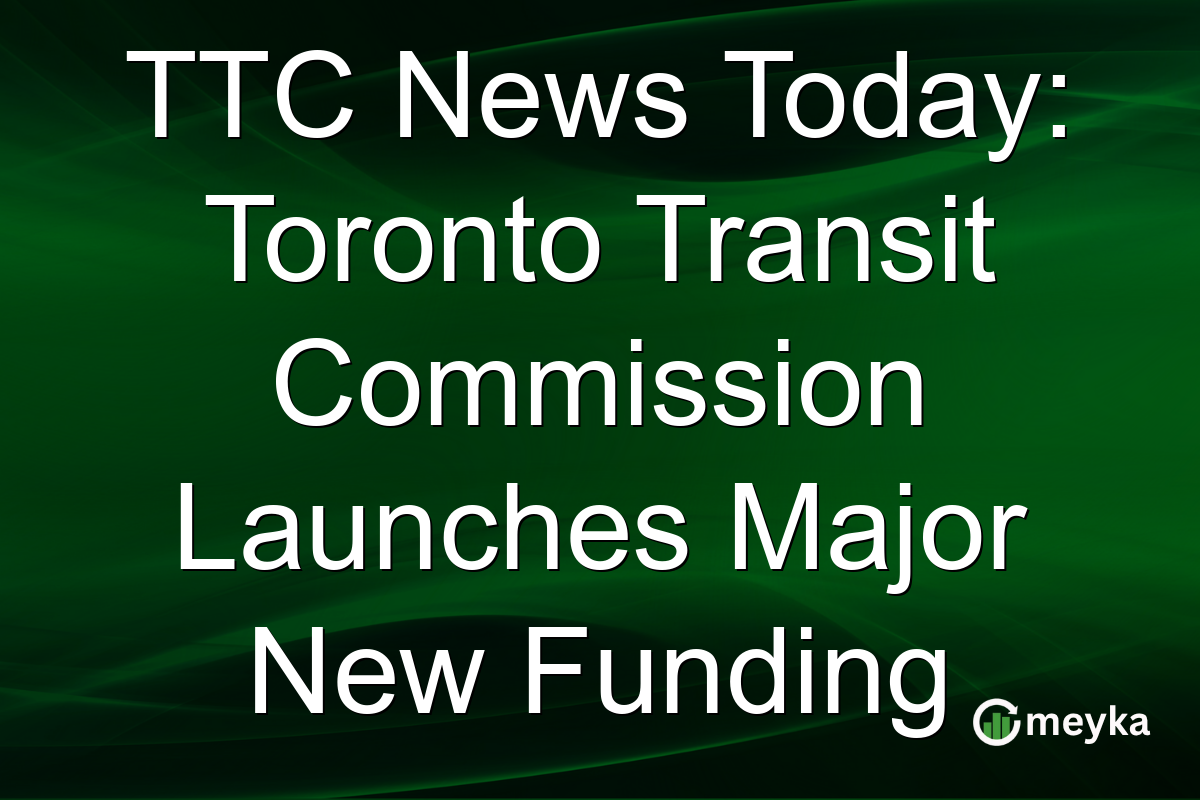TTC News Today: Toronto Transit Commission Launches Major New Funding
Today’s major headline in Canada is all about the Toronto Transit Commission (TTC) unveiling a substantial new funding initiative. This development marks a critical step in upgrading Toronto’s transit infrastructure. With a focus on ramping up efficiency and accommodating growth, this announcement positions the city as a developing hub in the realm of transport infrastructure. The fresh injection of resources aligns with growth trends and increases potential for public-private partnerships. Let’s explore what this means for Toronto’s transit landscape and the broader implications on city growth.
Significance of the Funding Announcement
The Toronto Transit Commission is set to receive a multimillion-dollar funding boost aimed at enhancing its infrastructure. This initiative, termed a “game-changer” by city officials, seeks to address long-standing issues in transit service such as delays and aging equipment. This move is timely, as Toronto continues to expand both in population and economic activity. This funding will support the upgrade of existing subway lines, bus routes, and the implementation of new smart technologies to manage transit more efficiently. Additionally, new lines could potentially be rolled out, increasing connectivity and reducing congestion.Learn more here. The public has long advocated for these improvements, making the new funding a much-anticipated victory. Industry experts project that efficient transit solutions bolster urban growth, reduce commuting times, and lower carbon emissions. The TTC’s commitment to this funding reflects broader global trends where cities invest heavily in sustainable public transport.
Impact on Toronto’s Growth and Infrastructure
Toronto’s fast-paced growth has been both a boon and a challenge. As one of Canada’s largest cities, effective transport solutions are crucial for maintaining economic vitality. The latest funding initiative by the TTC aligns with these needs.
By enhancing its transit capabilities, Toronto can better attract investment and talent, fulfilling a dual role as a business hub and a desirable residential area. Observers suggest that such infrastructure improvements could spur additional investments in real estate and commercial enterprises adjacent to transit lines.
Public-private partnerships are also poised to increase. The influx of funds may encourage private sector investment, with companies eager to contribute to and benefit from a robust transportation network. As Reuters highlights, strategic partnerships like these often drive more efficient project completions and innovative infrastructural solutions.
Public Sentiment and Potential Challenges
Public reaction to the TTC’s announcement has been largely positive, yet cautious. While funding promises great potential, execution and transparency remain key concerns among citizens. Many recall past projects that faced delays and budget overruns; thus, accountability will be critical. To address these concerns, the TTC plans to maintain open communication with the public, providing regular updates on progress. Moreover, community engagement initiatives will allow residents to voice their needs and feedback, ensuring the funds are utilized effectively and address the most significant pain points. Toronto’s leadership is aware that efficient handling of this project could serve as a benchmark for future infrastructure improvements across Canada, reinforcing confidence in government-managed initiatives.
Final Thoughts
The TTC’s latest funding initiative represents a pivotal moment for Toronto’s transit infrastructure. As the city continues to grow, the need for modern, efficient transportation solutions becomes increasingly urgent. By realizing these upgrades, Toronto sets itself on a path of sustained economic growth and improved quality of life for its residents. This funding not only addresses immediate transit concerns but also opens the door for further investments and partnerships, both public and private. As Toronto moves forward, the commitments made today by the TTC could well define the city’s economic landscape for years to come. For those keen to stay informed on developments like this, platforms like Meyka offer real-time insights and analytics, particularly useful for investors and stakeholders navigating shifts in urban infrastructure. Ultimately, how this initiative unfolds will be an indicator of Toronto’s strategy in leveraging transit as a cornerstone of its urban planning.
FAQs
The TTC aims to enhance Toronto’s transit infrastructure by upgrading subway lines, bus routes, and implementing smart technologies. This is to improve efficiency, reduce congestion, and accommodate city growth.
Improved transit solutions attract investment and talent, boosting economic vitality. Enhanced infrastructure can also spur real estate and commercial investments, fostering overall urban growth.
Key challenges include execution delays and maintaining budget discipline. Public accountability and communication will be crucial to mitigate skepticism and ensure effective fund utilization.
Disclaimer:
This is for information only, not financial advice. Always do your research.






